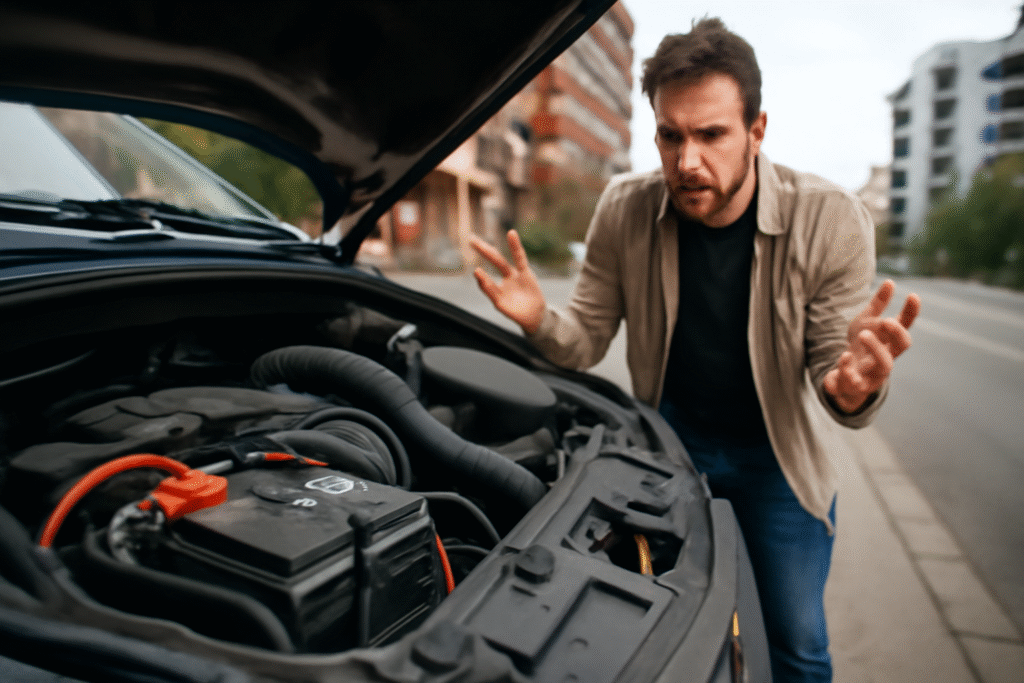
Essential Tips for Maintaining Car Electrical System: Expert Advice to Prevent Costly Repairs and Boost Longevity
Have you ever been stranded with a dead battery or had your headlights flicker at the worst possible moment? 
In this article, we’ll share essential tips for maintaining your car’s electrical system—expert advice designed to help you prevent costly repairs, boost your vehicle’s lifespan, and keep it running smoothly. Whether you’re a first-time car owner or a seasoned driver, understanding and maintaining your car’s electrical system is crucial for avoiding frustrating issues down the road.
Stay tuned for practical, actionable insights that will empower you to take control of your car’s electrical health and save money on future repairs!
Table of Contents
ToggleUnderstanding the Car Electrical System
Before diving into tips for maintaining your car’s electrical system, it’s important to understand what makes up this vital component of your vehicle. The electrical system in your car is responsible for powering everything from the engine to the lights and even the air conditioning. Without it, your car simply won’t function properly.
Let’s break it down:
Key Components of Your Car’s Electrical System:
- Battery
The battery is the heart of the electrical system. It provides the initial power to start the engine and stores energy for use when the engine is off. A weak or old battery can leave you stranded and cause other electrical problems. - Alternator
Once the engine is running, the alternator takes over. It recharges the battery and powers the car’s electrical components while the engine runs. If your alternator fails, your battery will quickly lose power, and your car will stop running. - Fuses
Fuses protect your electrical system from overloading. If too much current flows through a circuit, the fuse blows to prevent damage. Keeping fuses in good condition is essential for maintaining a stable electrical system. - Wiring
The wiring in your car carries electricity to various components. Damaged, corroded, or frayed wires can lead to electrical failures, and in some cases, fires.
Why Your Car’s Electrical System Matters:
A properly functioning electrical system is crucial for the overall health of your vehicle. If any of the components—such as the battery, alternator, or wiring—fails, it can lead to a cascade of problems. Some common signs of an electrical issue include:
- Dim or flickering headlights
- Difficulty starting the engine
- Electrical components malfunctioning (power windows, air conditioning, etc.)
By maintaining these components and addressing issues early on, you can avoid costly repairs and ensure your car remains reliable for years to come.
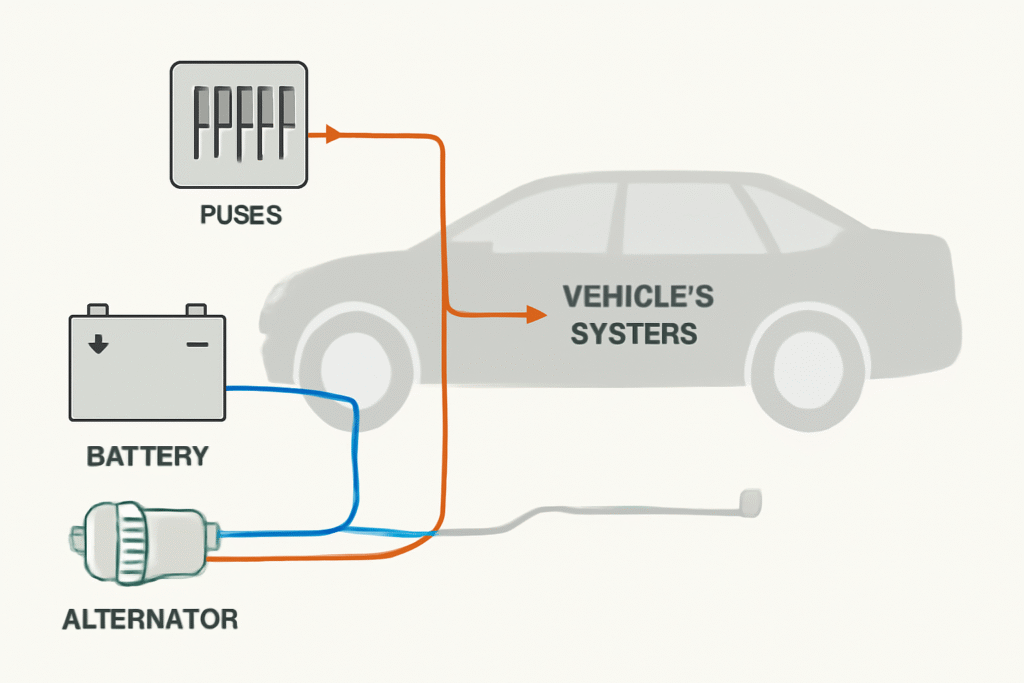
Top Tips for Maintaining Your Car’s Electrical System
Taking care of your car’s electrical system doesn’t have to be complicated. With regular checks and some simple maintenance, you can prevent many issues before they become expensive repairs. Here are the top tips for maintaining your car’s electrical system that every car owner should know:
1. Regularly Check and Replace the Battery 
Your car’s battery is the primary power source, so it’s important to keep it in good condition. Over time, batteries can lose their charge or even fail without warning.
Actionable Tips:
- Test your battery every 6 months, especially if it’s over 3 years old. Most auto parts stores offer free battery testing.
- Check for corrosion on the battery terminals. If you see white, powdery buildup, clean it with a mixture of baking soda and water to prevent electrical issues.
- Replace the battery if it’s older than 3-5 years or showing signs of wear, like slow engine cranking or dim lights.
2. Inspect the Alternator Regularly 
The alternator keeps your battery charged and powers your car’s electrical systems while driving. A malfunctioning alternator can leave you with a dead battery and stranded on the road.
Actionable Tips:
- Look for warning signs like dim headlights, electrical malfunctions, or an illuminated “battery” warning light on the dashboard.
- Have the alternator tested by a professional during regular maintenance, especially if your car is more than 5 years old.
3. Maintain Fuses and Fuse Box 
Fuses protect the electrical system from overloads. If a fuse blows, it can stop certain components, like your headlights or radio, from working.
Actionable Tips:
- Check the fuse box regularly. If a fuse blows, replace it with one of the same rating. Avoid overfilling the fuse box with too many fuses.
- Keep spare fuses in your car to replace any that blow unexpectedly. This simple step can save you time and trouble when things go wrong.
4. Clean and Secure Wiring 
Wiring issues are often overlooked, but they can cause serious damage to your electrical system. Frayed or exposed wires can lead to short circuits, electrical fires, or system failures.
Actionable Tips:
- Inspect wires for signs of wear, corrosion, or exposure. If you find any damaged wires, have them replaced as soon as possible.
- Use wire looms or covers to protect vulnerable wiring from damage, especially in areas where it’s exposed to moisture or high heat.
5. Address Electrical Issues Promptly 
Ignoring small electrical problems can lead to bigger, more expensive issues. If you notice any electrical malfunction, it’s best to address it early before it affects other components.
Actionable Tips:
- Pay attention to warning signs like flickering lights, malfunctioning power windows, or strange noises from the alternator.
- Schedule regular professional checks to keep everything in top shape. It’s easier and cheaper to prevent problems than to fix them once they become serious.
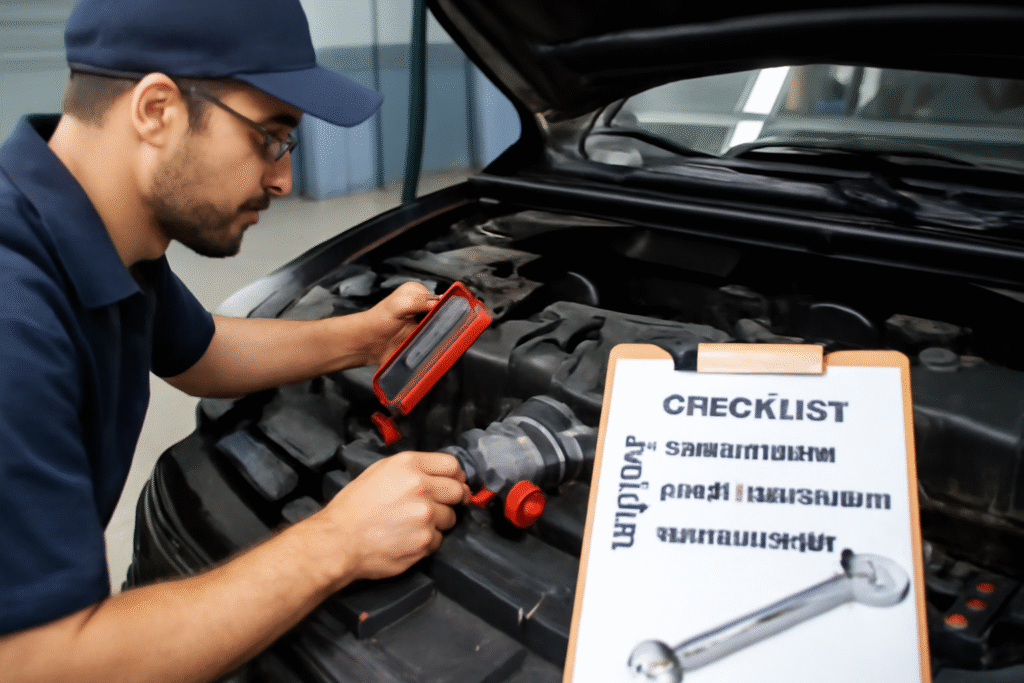
The Do’s and Don’ts of Car Electrical Maintenance
When it comes to maintaining your car’s electrical system, knowing what to do—and what to avoid—can make all the difference. Here are some essential do’s and don’ts that will help you take care of your vehicle’s electrical components and keep it running smoothly.
 Do’s:
Do’s:
- Do Disconnect the Battery When Working on Electrical Components
Always disconnect the battery before working on any electrical parts to prevent accidental shocks or short circuits. This is a simple but crucial safety step. - Do Regularly Inspect Your Car’s Battery and Alternator
Even if you don’t notice any problems, inspect your battery and alternator at least twice a year. Look for signs of corrosion or wear and check their voltage regularly to prevent unexpected breakdowns. - Do Use the Right Tools
When handling electrical components, use insulated tools to avoid damaging the wiring or components. Proper tools also help ensure your safety while performing routine checks. - Do Keep the Wiring Clean and Protected
Clean wiring helps avoid corrosion and short circuits. Use protective covers or wire looms to keep your car’s wiring safe from harsh conditions like heat and moisture. - Do Schedule Professional Inspections
Have a professional mechanic inspect your car’s electrical system every year. Regular expert checks help catch problems early, saving you from more costly repairs down the line.
 Don’ts:
Don’ts:
- Don’t Ignore Warning Lights or Electrical Issues
If your dashboard lights indicate an issue with the electrical system, don’t ignore them! Delaying repairs can lead to bigger problems, such as a dead battery or damaged alternator. - Don’t Mix Up Fuses or Wiring
Never substitute a fuse with one of a different rating, and avoid mixing up the wiring when replacing electrical components. Doing so can cause further damage to your car’s electrical system and even pose a fire risk. - Don’t Overload Your Electrical System
Adding too many electrical components, like high-powered lights or aftermarket gadgets, can strain your car’s electrical system. Stick to manufacturer recommendations and avoid overloading the system. - Don’t Attempt Major Electrical Repairs Without Professional Help
Car electrical systems are complex, and trying to fix major issues yourself can lead to bigger problems or safety hazards. Always consult a professional mechanic for complex repairs. - Don’t Let Your Battery Sit for Too Long
If your car is not being used for extended periods, the battery can lose its charge. Consider disconnecting the battery or using a battery maintainer to keep it in good shape during downtime.
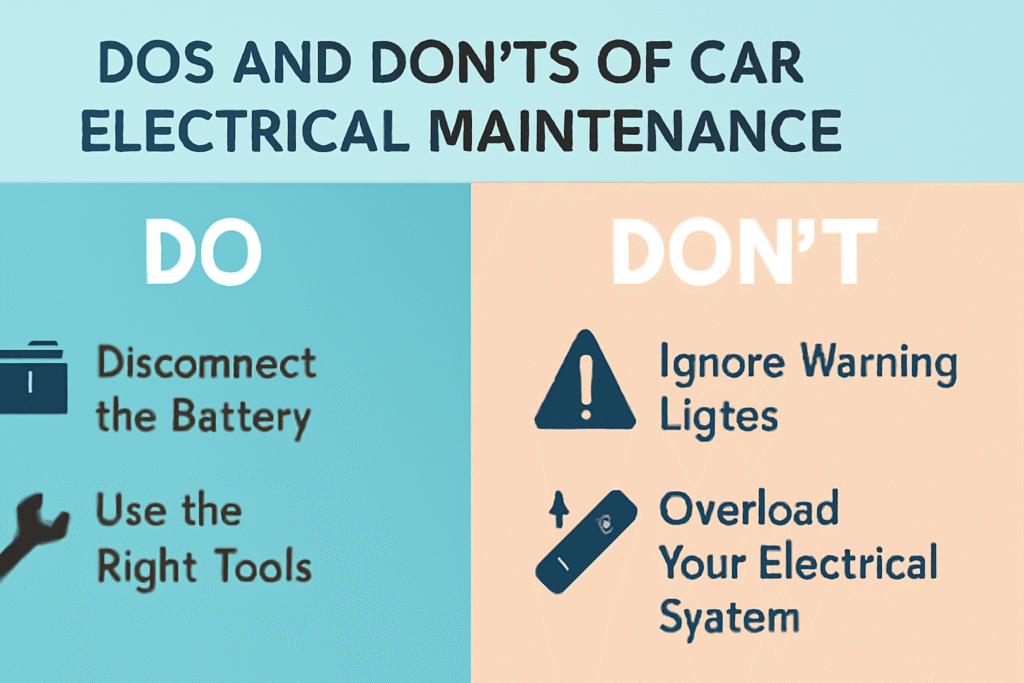
Common Myths About Car Electrical Systems
When it comes to car maintenance, there are plenty of myths that can lead you down the wrong path. Car electrical systems are no exception. Let’s debunk some of the most common misconceptions so you can make informed decisions and avoid unnecessary headaches.
Myth 1: Car Electrical Systems Never Need Maintenance

Most car owners believe that the electrical system is a “set-it-and-forget-it” component, but this is far from true. If not maintained properly, components like the battery, alternator, and wiring can fail unexpectedly. Regular checks can prevent small issues from turning into costly repairs.
Myth 2: You Can’t Prevent Electrical Problems

While some electrical issues may happen due to age or wear, many can be avoided with proactive care. Regularly cleaning the battery terminals, checking fuses, inspecting wiring, and monitoring the alternator can all prevent major electrical malfunctions.
Myth 3: Electrical Problems Are Always Expensive to Fix

Not every electrical problem means a trip to the mechanic with a hefty bill. In fact, some issues—like a dead battery or blown fuse—can be fixed easily and affordably. The key is catching problems early, so they don’t escalate into something more expensive.
Myth 4: The Car Battery Only Powers the Car to Start

It also powers electrical components like lights, the radio, and your car’s onboard computer when the engine is off. A battery that isn’t functioning properly can cause all sorts of electrical issues, so it’s crucial to keep it in good condition.
Myth 5: Fuses Don’t Need to Be Checked Regularly

While fuses are designed to blow when there’s an overload, they can sometimes fail even without visible signs. Keeping a close eye on your car’s fuses ensures that all circuits remain protected and prevents potential electrical failures.
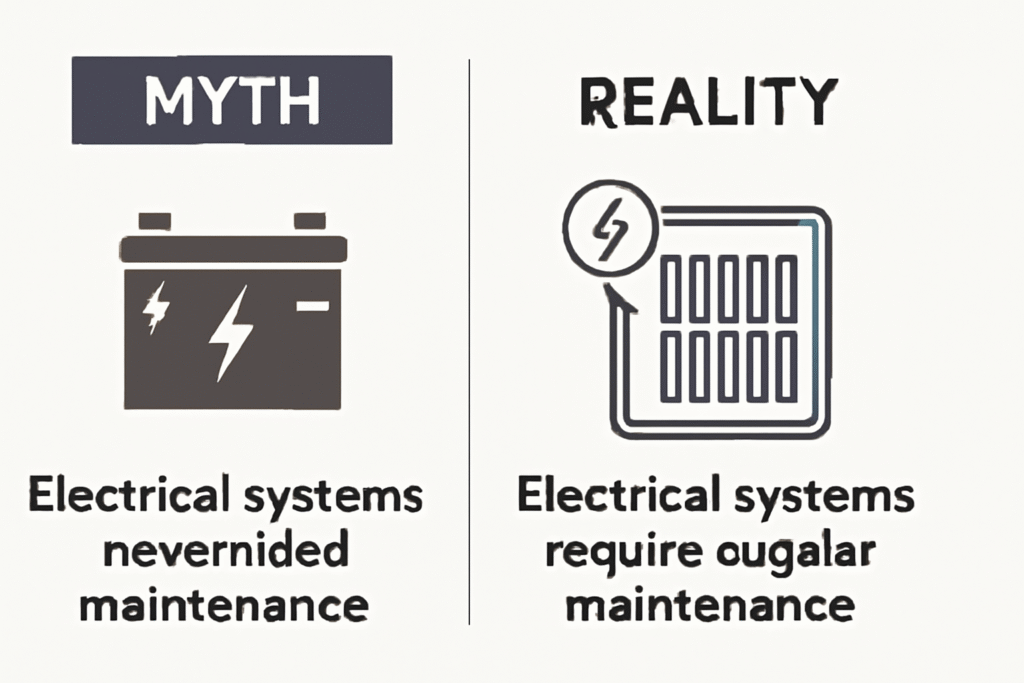
Taking care of your car’s electrical system is one of the best ways to ensure your vehicle runs smoothly and avoid unexpected breakdowns. By following the essential tips for maintaining your car’s electrical system, such as regularly checking the battery, inspecting the alternator, maintaining fuses, and securing wiring, you can extend the life of your vehicle and prevent costly repairs.
Remember, the electrical system is the backbone of your car’s functionality. A little proactive maintenance goes a long way in keeping everything running efficiently. Don’t wait for a problem to arise—schedule regular checks, pay attention to warning signs, and address issues promptly.
By staying on top of your car’s electrical health, you’re not just avoiding expensive repairs; you’re also ensuring a safer, more reliable driving experience for years to come.
So, take action today! Check your battery, inspect your wiring, and keep your electrical system in top condition. Your car—and your wallet—will thank you!
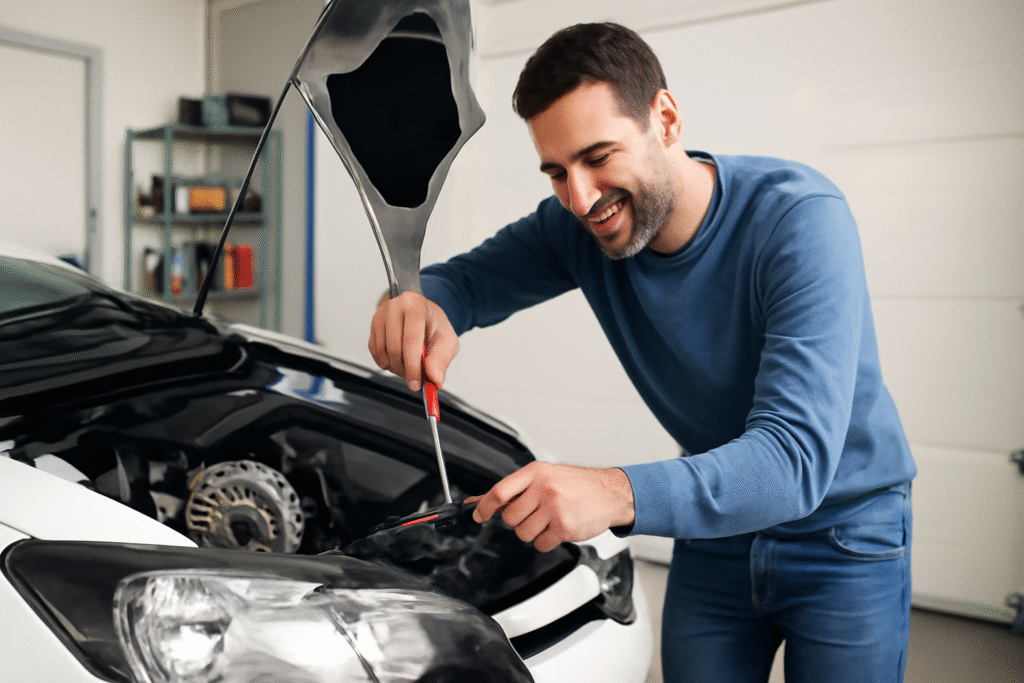
Frequently Asked Questions (FAQ)
1. How often should I check my car's battery?
You should check your car’s battery every 6 months, especially if it’s over 3 years old. Look for signs of corrosion or wear, and test the battery’s voltage to ensure it’s holding a charge. Replacing the battery every 3-5 years is also recommended to prevent unexpected failures.
2. What are the common signs that my car’s electrical system is failing?
Common signs of electrical issues include dim or flickering lights, difficulty starting the engine, malfunctioning power windows or air conditioning, and a warning light on your dashboard. If you notice any of these, it’s important to check the electrical system promptly to prevent more serious problems.
3. How do I maintain my car's alternator?
The alternator should be inspected regularly for wear, especially if your car is more than 5 years old. Look out for warning signs like dimming headlights or strange noises. If you experience these issues, have the alternator tested by a professional to ensure it’s functioning properly.
4. Can I maintain my car’s electrical system myself?
Yes, many aspects of electrical maintenance, such as checking the battery, cleaning the terminals, and inspecting fuses, can be done at home. However, more complex issues, like alternator or wiring problems, are best handled by a professional mechanic.
5. Why is it important to check fuses regularly?
Fuses protect your electrical system from overloads, and a blown fuse can cause certain components (like headlights or radios) to stop working. Regularly check and replace any blown fuses to avoid unexpected electrical failures and keep your car running smoothly.
6. What should I do if my car’s lights are flickering?
Flickering lights can be a sign of an issue with your alternator or battery. First, check the battery for corrosion or wear, and ensure the alternator is functioning correctly. If the problem persists, it’s best to consult a mechanic to diagnose and fix the issue.
7. How do I prevent my car battery from corroding?
To prevent corrosion, regularly clean the battery terminals with a mixture of baking soda and water. Tighten the connections and apply petroleum jelly to the terminals to help protect them from moisture and corrosion.
8. When should I replace my car battery?
Replace your car battery every 3 to 5 years, depending on its condition. If you notice difficulty starting your engine, dim lights, or a “battery” warning light, it may be time to replace the battery sooner. Regular battery checks can help prevent unexpected failures.






